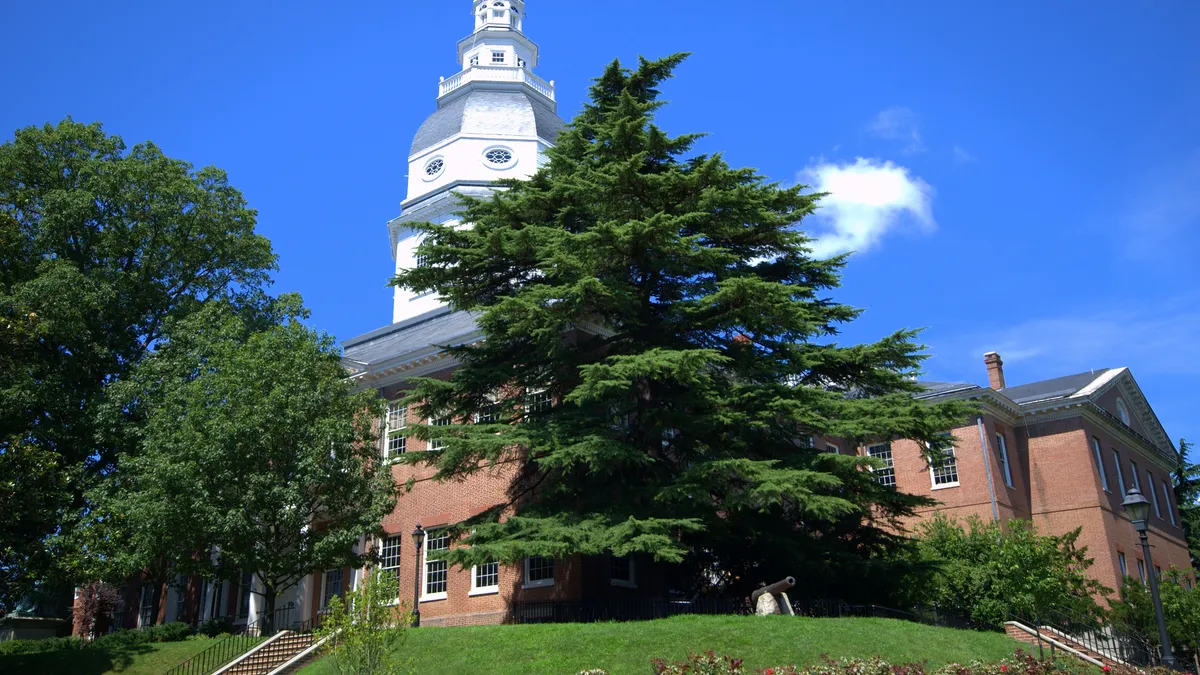Dive Brief:
- Maryland has moved to restrict how much federal aid for-profit colleges that educate its residents can take from enrolling active-duty military and veterans.
- The General Assembly approved a bill this week that would make Maryland the first state to close a loophole in what's known as the federal 90/10 rule, which prevents for-profit schools from receiving more than 90% of their revenue from student aid. Military education benefits have historically not counted in that calculation.
- Veterans' advocacy groups and lawmakers are celebrating the bill's passage, but critics say it could jeopardize Maryland's participation in an interstate pact that allows colleges to offer online education more easily nationwide.
Dive Insight:
Last year, the U.S. Department of Education issued new federal regulations governing how states authorize distance learning providers.
Consumer advocates who worked with the department to develop the rules were rankled over one particular provision: States that are part of interstate distance learning agreements would no longer be able to enforce some of their own laws.
That's because the department took out language in the regulations that allowed these states to enforce laws targeting a "subgroup of educational institutions," such as for-profits, which have been accused of defrauding students.
All states but California are members of such an agreement, called the State Authorization Reciprocity Agreement (SARA). By the time the rules take effect in July, almost all state laws on distance learning, specifically, would be neutered.
Maryland's bill intends to pose new limits on for-profit schools by forcing them to include military and veteran benefits when determining how much federal aid they rely on for revenue. Many large for-profit chains, such as the University of Phoenix and Ashford University, are not based in Maryland but still educate the state's residents. They take in significant amounts of revenue from military benefits. U of Phoenix received $192.5 million in GI Bill tuition and fees in 2017, according to a recent report from advocacy group Veterans Education Success.
The 90/10 rule, which is part of the Higher Education Act, is meant as a proxy for quality, in that institutions should be able to find at least 10% of their revenue from private sources. Military benefits have not applied to the cap, and for-profits have come under fire for aggressively trying to recruit veterans.
NC-SARA, the organization that oversees the reciprocity agreement, told Education Dive earlier this month that the legislation would risk Maryland's membership in SARA because it violated both the Education Department's rules and NC-SARA's nearly identical policies. The bill would need to be amended to make explicit exceptions for institutions that take part in SARA, its representatives said at the time.
Lori Williams, NC-SARA's president and CEO, said in a written statement to Education Dive on Thursday that the Southern Regional Education Board, which monitors Maryland's participation in the agreement, has been discussing "potential unintended consequences" of the bill with state regulators, the Maryland Higher Education Commission (MHEC).
"NC-SARA shares these concerns about this pending legislation," Williams said. She did not elaborate on what those consequences could be.
However, Christopher Madaio, an assistant attorney general with the state's consumer protection division, has indicated the bill does not need to be rewritten.
NC-SARA prohibits Maryland from applying laws to out-of-state schools, but it doesn't stop them from having those laws on the books, Madaio wrote in a letter to the chair of the state House of Delegates' appropriations committee. By the terms of the agreement, MHEC would not apply those laws to NC-SARA institutions, he added.
"It (is) important to keep the law as drafted and not amend it so that if the NC-SARA manual changes and permits states to apply their laws to NC-SARA schools, the veterans protections could be applied in the future," Madaio wrote.
Neither MHEC nor the office of Gov. Larry Hogan responded to a request for comment on Thursday. The bill now heads to Hogan, a Republican, for consideration. A spokesperson for Hogan told The Washington Post that the governor will "give the legislation thoughtful consideration when it reaches his desk."















